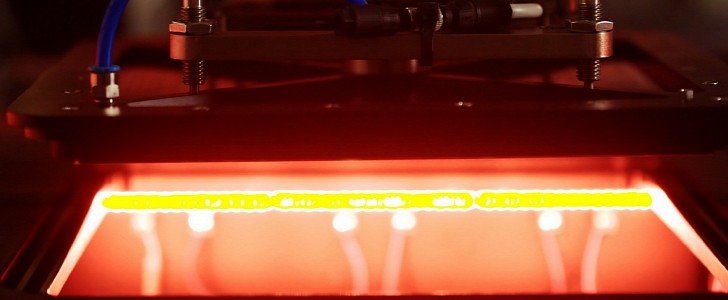There is one thing that QuantumScape said it had to solve for its solid-state cells to succeed: a format that deals well with the swelling that lithium metal batteries naturally present. In its letter to shareholders, the company stated that it has already developed a proprietary cell format that can deal with the “uniaxial volume expansion.” But there’s more.
QuantumScape also gave us a crucial tip about its fourth automotive partner. The battery startup announced it on March 1. In QuantumScape’s words, it was the third top-10 automaker by revenue testing its solid-state batteries and the fourth one in total. The battery startup has a fifth company trying its cells, but it is not an automaker.
We already knew all that, including that this new company wants “at least five MWh of capacity” from the “QS-0 pre-pilot production line facility.” QuantumScape also said the new partner wanted to form a joint venture able to produce 50 GWh un solid-state batteries.
The 5 MWh would be enough to produce 50 prototypes with 100-kWh battery packs. The 50 GWh per year in solid-state cells will allow this automaker to manufacture 500,000 cars with the same battery pack or even more if they are smaller. That shows it is a high-volume carmaker.
The battery startup disclosed the list of 10 biggest carmakers by revenue, among which was its new partner. It included Volkswagen, Toyota, Daimler, Ford, Honda, General Motors, Mitsubishi, SAIC Motors, BMW, and Nissan. Stellantis was not included.
Volkswagen has been an early and open investor in QuantumScape: everybody knows it will be the first company to get them. Japanese companies are after their own solid-state cells, so we can exclude them. There are five left: Daimler, Ford, GM, SAIC, and BMW. QuantumScape now disclosed that the joint venture would be established in the U.S.
Ford and BMW invested in Solid Power for their solid-state cells. Although that does not mean they cannot talk to QuantumScape about that, it leaves GM as the most likely new partner. It is worth remembering that GM also has a partnership with SES, a battery company that already said it does not believe solid-state cells are economically feasible. GM may have decided not to trust that and ensure both solutions could suit its needs.
Whatever the new partner is, there’s a great chance it is an American carmaker, even if any company with factories in the U.S. could benefit from such a deal. QuantumScape wants to start supplying its first A samples in 2022. Next year, it wants its partners to have B samples, those already manufactured by machines in the final industrial process.
QuantumScape’s proprietary format will be presented with 16-layer cells. The A samples will have dozens of layers, but the battery startup did not state how many. That is probably the number the production version of the solid-state batteries will have. The startup is confident about delivering them sometime around 2024, 2025, tops.
We already knew all that, including that this new company wants “at least five MWh of capacity” from the “QS-0 pre-pilot production line facility.” QuantumScape also said the new partner wanted to form a joint venture able to produce 50 GWh un solid-state batteries.
The 5 MWh would be enough to produce 50 prototypes with 100-kWh battery packs. The 50 GWh per year in solid-state cells will allow this automaker to manufacture 500,000 cars with the same battery pack or even more if they are smaller. That shows it is a high-volume carmaker.
The battery startup disclosed the list of 10 biggest carmakers by revenue, among which was its new partner. It included Volkswagen, Toyota, Daimler, Ford, Honda, General Motors, Mitsubishi, SAIC Motors, BMW, and Nissan. Stellantis was not included.
Volkswagen has been an early and open investor in QuantumScape: everybody knows it will be the first company to get them. Japanese companies are after their own solid-state cells, so we can exclude them. There are five left: Daimler, Ford, GM, SAIC, and BMW. QuantumScape now disclosed that the joint venture would be established in the U.S.
Ford and BMW invested in Solid Power for their solid-state cells. Although that does not mean they cannot talk to QuantumScape about that, it leaves GM as the most likely new partner. It is worth remembering that GM also has a partnership with SES, a battery company that already said it does not believe solid-state cells are economically feasible. GM may have decided not to trust that and ensure both solutions could suit its needs.
Whatever the new partner is, there’s a great chance it is an American carmaker, even if any company with factories in the U.S. could benefit from such a deal. QuantumScape wants to start supplying its first A samples in 2022. Next year, it wants its partners to have B samples, those already manufactured by machines in the final industrial process.
QuantumScape’s proprietary format will be presented with 16-layer cells. The A samples will have dozens of layers, but the battery startup did not state how many. That is probably the number the production version of the solid-state batteries will have. The startup is confident about delivering them sometime around 2024, 2025, tops.







